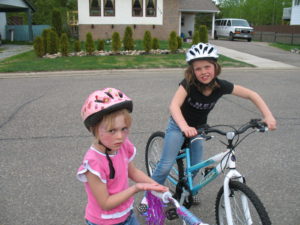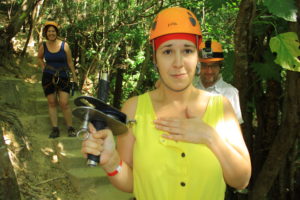
Social anxiety is the fear of being judged by other people; but it’s not other people’s judgment we fear, it’s our own. If we can handle criticism and rejection without becoming devastated, we don’t fear social situations.
If each rejection, no matter how slight, triggers an onslaught of our own negative judgments, we become fearful of anything that might set this off. We must learn to handle negativity from others without turning on ourselves. The ability to nurture and soothe ourselves is critical to enjoying relationships with others.
The Fear of Self Criticism
One young woman who came for counselling told me she rarely left her house. She had no friends and said she couldn’t work because the social interactions were too painful. She said whenever she was around people, someone would inevitably say or do something to upset her, and she would be depressed for weeks. She felt the only way to avoid pain was to avoid people.
This woman saw herself as stupid, ugly, worthless, and unlovable. She constantly watched other people, looking for signs that they saw her the way she saw herself. Every look, gesture, and comment was proof of their judgment and disapproval of her.
When she felt rejected or judged, it triggered an onslaught of self-shame and self-loathing that was excruciating. The sad part was little of what she thought others were thinking was based on fact; it was based on her own thoughts and self-judgment.
We need to be able to trust ourselves to handle uncomfortable situations without becoming devastated. It’s justified to feel hurt or slighted when someone is rude; it’s not justified to feel devastated. While we can get over being hurt, it’s not so easy to get over being devastated by our own feelings of worthlessness and shame.
What I Wanted to Tell Her

This young woman was sensitive, caring, intuitive, gentle, and beautiful. I wanted to tell her this, but she would have disregarded it because she didn’t believe it herself. My job was not to tell her how great she was, it was to help her discover it for herself.
The sad part is, she felt bad about herself, not because of anything she had done, but because of what was done to her. Her parents were neglectful and abusive, she was bullied at school, and she was mistreated by more than one guy, starting at a young age.
Although I’m sharing this story about a particular woman, in reality this is the story of many clients; both men and women, young and old. Each of them feeling a shame that isn’t theirs.
Causes of Social Anxiety

Most people can point to a particular incident or bad time in their lives when the social anxiety started. Often it starts with bullying in school or some other experience with someone mean and spiteful.
Not only is bullying a terrifying and humiliating experience, it creates self-doubt about our likeability and worthiness and it can stay with us a lifetime.
Sometimes we see hurtful behaviour of others as proof of our inherent unworthiness. The fact is, we don’t get mistreated because of our flaws and imperfections, we get mistreated because of the flaws and imperfections of others.
Sensitive children are often targeted for bullying; not because they are unlikable; just the opposite. A bully knows that the nice kid won’t strike back. Nice kids are safe targets on which bullies vent their own frustrations and insecurities; without fear of reprisals.
Treatment for Social Anxiety
Some people outgrow social anxiety, but it can take years. If you don’t want to wait until you’re fifty-years-old to feel comfortable in your own skin, there is effective treatment available.
Research has shown DBT, a form of Cognitive Behavioural Therapy is an effective treatment for anxiety. Irrational thoughts are replaced with rational thoughts as the person learns to value their self worth. Anxiety is irrational because there is no actual danger. If there is real danger, then it’s not anxiety, it’s fear.

Fear is critical to our survival and keeps us safe and alert. Anxiety is an over-reaction to imagined danger. It makes us hyper-vigilant and causes us to perceive danger when there isn’t any.
Some people benefit from a combination of DBT and medication. The medication calms down anxious thoughts and ruminations so you think more rationally. Many people go off medication after six months and continue to stay calm.
Learning relaxation techniques like deep breathing exercises, meditation, and yoga can also help in calming anxiety. To learn more about treatment for anxiety, check out additional resources at the bottom of the page.
DBT Skill: Opposite Action
Every emotion causes an urge. When we are anxious, we get the urge to run away. When we are angry, we get the urge to lash out. When we are depressed, we want to stay in bed all day with the covers over our head.
Often our urges push us to do the exact opposite of what is helpful. When we’re anxious, we need to face our fears to realize the danger isn’t real. When we’re depressed, we need to get out of the house. If we’re angry, we need to stay calm and understand the other person’s perspective. All these things are the exact opposite of what we feel like doing.
How to Do Opposite Action
To do opposite action, first you need to find the emotion you want to change. Check the facts to see if your emotion is justified. It’s justified to be slightly nervous when meeting new people, but fear and dread is not.

Identify the urge that your emotions create and ask yourself if acting on the urge would help or make things worse? If your urge is counter-productive, find the opposite action to the urge and commit to doing it. Don’t do it half-heartedly by going to the party and sitting in the corner. If you are truly going to do opposite action you must go to the party and throw yourself into having a good time.
If you apply opposite action consistently to your urges, you will start to notice a decrease in your emotions over time. If you constantly expose yourself to things that make you anxious, your brain learns there is nothing to fear. The more you learn to trust yourself, the safer you become.
You block your dream when you allow your fear to grow bigger than your faith.
Mahatma Gandhi
If you have an experience you’d like to share, add a comment at the bottom of the page. I’d love to hear from you.
For specific DBT skills go to DBT Skills in the menu bar.
Related Posts
Pain is Inevitable, Suffering is Optional
How to Stop Faulty Thinking Habits
Are you Listening? Validate Yourself
Additional Resources
Worksheet to Help Challenge and Change Thoughts
